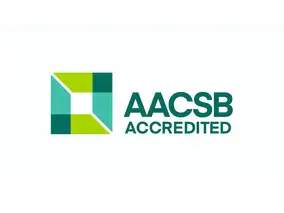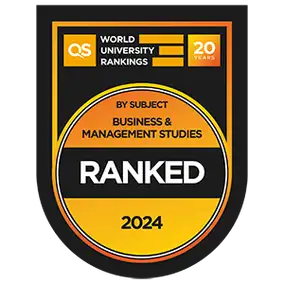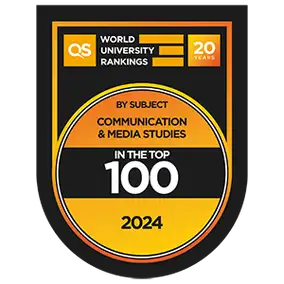Type of qualification
Level of study
An undergraduate qualification is usually the first one you study.
Our courses follow the New Zealand Qualification Framework (NZQF) levels.
Time to complete
International students
International students are not New Zealand citizens or residents.
Study a Bachelor of Communication – BC
The world needs communicators. It needs people who have the creativity and imagination to develop content that will inspire and connect people. It needs those with the logic, analysis and language skills to deliver that content in a strategic and meaningful way.
Unique variety in your study - just like the working world
Massey’s Bachelor of Communication is the only communication degree in New Zealand that requires you to take courses in both business and arts. You’ll probably discover that neither is what you expected. You may even love most a subject you didn’t think you would! Combining words and creativity with business will make you a highly-employable communication specialist.
You’ll graduate not just with a degree, but as a well-rounded, innovative communication specialist who is sought-after by employers. In our survey of past graduates, 84% believed that their BC studies were relevant to their present work.
The Bachelor of Communication builds the skills you need to make an outstanding contribution in whatever field interests you. You will gain skills in using up-to-date technology, and you will have the opportunity to obtain deep insights into the communication industry.
Real-world learning
The Bachelor of Communication offers you many opportunities to apply your learning to real-world problems. You’ll produce strategies, media and publications that apply your communication learning.
These can include marketing strategies for community groups, social media content, documentary films, scripts for theatre, media or film, performances and speeches, depending on the courses you choose.
You’ll learn from internationally renowned staff. Massey has the oldest journalism school in New Zealand. Our teachers in the Bachelor of Communication expressive arts courses (theatre, creative writing and media production) have won five national teaching awards.
Insights
- The 2021 Student Experience Survey results for this qualification found that 83% believed that teaching staff are helpful and approachable, and 92% highlight that the qualification has given them excellent “written communication skills”.
- The 2020 Graduate Destination Survey results for this qualification found that 82% of graduates are in employment and 12% have continued in further study. The most common job title for graduated students was “Marketer”.
- Between 2018 and 2021 the average number of students enrolled in the qualification was 748 (headcount). In the 2020 academic year, 78% of students in the first year of this qualification continued their studies and across the whole qualification 83% of courses were successfully completed.
- The QS World University Ranking by Subject ranks Massey in the top 100 universities worldwide in this subject area. Shanghai Ranking's Global Ranking of Academic Subjects 2022 ranks Massey in the top 150 universities globally and 1st in New Zealand in this subject area.
Further study
You may wish to consider moving on to postgraduate study once you have completed your degree.
A BC is a good fit if you:
- enjoy connecting with people
- like using creativity to solve practical problems
- enjoy doing lots of different interesting things every day to keep your brain stimulated.
Entry requirements
Admission to Massey
All students must meet university entrance requirements to be admitted to the University.
Specific requirements
There are no specific entry requirements for this qualification, outside of university admission regulations.
English language requirements
To study this qualification you must meet Massey University's English language standards.
Prior learning, credit and exemptions
For information on prior learning, exemptions and transfer of credit or other questions:
- review the Recognition of Prior Learning regulations
- contact us through the Get advice button on this page.
English language skills
If you need help with your English language skills before you start university, see our English for Academic Purposes (EAP) courses.
Official regulations
To understand what you need to study and must complete to graduate read the official rules and regulations for this qualification.
You should read these together with all other relevant Statutes and Regulations of the University including the General Regulations for Undergraduate Degrees, Undergraduate Diplomas, Undergraduate Certificates, Graduate Diplomas and Graduate Certificates.
Returning students
For returning students, there may be changes to the majors and minors available and the courses you need to take. Go to the section called ‘Transitional Provisions’ in the Regulations to find out more.
In some cases the qualification or specialisation you enrolled in may no longer be taking new enrolments, so may not appear on these web pages. To find information on the regulations for these qualifications go to the Massey University Calendar.
Please contact us through the Get advice button on this page if you have any questions.
Structure of the Bachelor of Communication
Full-time study in the first year comprises eight 15-credit courses, for a total of 120 credits. We recommend studying 60 credits per semester. You may also wish to take some courses at summer school but ensure you include those that are required for the next level of courses.
In your first year, you complete a core of set courses as part of your degree. The first year core means you get to meet other Bachelor of Communication students as a group and form an overview of all parts of communication before you specialise.
At the start of your second year you choose the area you are most interested in (your major). You also choose a second field of interest (your minor) and from a huge range of optional (elective) courses.
Typical pattern for the Bachelor of Communication
Core courses These courses are a compulsory part of your qualification.
Major courses Choose from a selection of courses appropriate for your specialisation.
Minor courses A minor is compulsory. Study a second subject area from within the Bachelor of Communication.
Elective courses Follow your interests. Your qualification may have selection guidelines for elective courses.
| Year one |
|---|
| 115111 Communication Theory and Practice |
| 115116 Introduction to Marketing |
| 139133 Creative Communication |
| 154101 Introduction to Media Studies |
| 172131 Language and Communication |
| 219101 Media Skills |
| 219108 Introduction to Journalism |
| 230111 Tū Kupu: Writing and Inquiry |
| Year two |
|---|
| 200-level major |
| 200-level major |
| 200-level major |
| 200-level major |
| 200-level minor |
| 200-level minor |
| Elective |
| Elective |
| Year three |
|---|
| 300-level major |
| 300-level major |
| 300-level major |
| 300-level major |
| 200-level minor |
| 300-level minor |
| Elective |
| Elective |
Courses are each worth 15 credits.
Note: some subjects for the International Languages minor do not require a 300-level course - the fourth course can be 200 (or 300) level.
Courses and specialisations
Key terms
- Courses
- Each qualification has its own specific set of courses. Some universities call these papers. You enrol in courses after you get accepted into Massey.
- Course code
- Each course is numbered using 6 digits. The fourth number shows the level of the course. For example, in course 219206, the fourth number is a 2, so it is a 200-level course (usually studied in the second year of full-time study).
- Credits
- Each course is worth a number of credits. You combine courses (credits) to meet the total number of credits needed for your qualification.
- Specialisations
- Some qualifications let you choose what subject you'd like to specialise in. Your major or endorsement is what you will take the majority of your courses in.
Credit summary
360 credits
- Core courses – 120 credits
- Major courses – 120 credits
- Minor courses – 60 credits
- Electives – 60 credits
Ensure that overall, you have:
- Not more than 165 credits at 100 level (including no more than 45 credits of 100‑level electives)
- At least 15 credits of electives at 200 level or above
- At least 75 credits at 300 level overall
- An approved combination of major and minor
Course planning key
- Prerequisites
- Courses that need to be completed before moving onto a course at the next level. For example, a lot of 200-level courses have 100-level prerequisite courses.
- Corequisites
- Courses that must be completed at the same time as another course are known as corequisite courses.
- Restrictions
- Some courses are restricted against each other because their content is similar. This means you can only choose one of the offered courses to study and credit to your qualification.
Part A: Core courses
Course code: 115111 Communication Theory and Practice 15 credits
This course identifies key theories and strategies to enhance written, oral, visual, and interpersonal communication for different purposes and audiences. Students explore, discuss, critique, and practise communication for a business and global environment and recognise how world views, culture, and contexts shape communication.
View full course detailsCourse code: 115116 Introduction to Marketing 15 credits
The course provides an understanding of the core concepts and practices of marketing.
View full course detailsCourse code: 139133 Creative Communication 15 credits
An introduction to the dynamics involved in creative communication. Students explore creative communication through work in, and analysis of, three creative forms: creative writing, theatre and digital media production.
View full course detailsCourse code: 154101 Introduction to Media Studies 15 credits
An introduction to theories of the media and communications. Particular attention will be paid to the concepts of representation and audience, the political economy of media products, and the social and cultural context in which they occur.
View full course detailsCourse code: 172131 Language and Communication 15 credits
An introduction to language with particular emphasis on spoken communication.
View full course detailsCourse code: 219101 Media Skills 15 credits
Understanding and working with the news media combining practical skills with critical and ethical perspectives on media use. Skills include media strategy, writing media releases, broadcast interviewing and running a media conference.
View full course detailsCourse code: 219108 Introduction to Journalism 15 credits
An introduction to the role and function of contemporary news media, with special attention to the role of the journalist in society, the diversity of journalism cultures and basic journalism skills.
View full course detailsCourse code: 230111 Tū Kupu: Writing and Inquiry 15 credits
This course introduces students to cultures of writing and inquiry in the Humanities and Social Sciences. It is designed to help students write effectively at undergraduate level by practising a variety of writing tasks, including analytical, persuasive, and research-based writing and argumentation. Students will learn practices of writing, research, peer-review and revision that have application in the university and broader contexts.
View full course detailsPart B: Specialisations
Majors
Some qualifications let you choose what subject you'd like to specialise in. Your major or endorsement is what you will take the majority of your courses in.
Completing a major is compulsory. A major requires 120 credits including at least 60 credits at 200 level and 60 credits at 300 level.
Although you are asked to nominate your major and minor, please be aware that you can change these once you are enrolled.
Communication Management
You’ll gain an understanding of the complexities, challenges, and rewards of interpersonal and organisational communication – you’ll be a communication specialist.
Digital Marketing
The Bachelor of Communication (Digital Marketing) is the only degree in New Zealand that combines business, marketing strategy, and creative visual and verbal communication skills.
Expressive Arts and Media Studies
This unique degree is for those who love being creative, writing and the performing arts, but also want to discover how the media shape our identities and our world.
Expressive Arts
If you love being creative and want to study a selection of theatre, performance, creative writing, and digital media production, and you also want great career prospects, the Bachelor of Communication (Expressive Arts) is for you.
Journalism
Join a prestigious group of leading journalists that have studied at Massey University – New Zealand’s longest-running, internationally accredited journalism qualification.
Linguistics
If you love language and want to broaden your career options in communication, the Bachelor of Communication (Linguistics) offers the best of both worlds.
Media Studies
Discover how the media shape our identities and our world. Massey will help you create, critique, and connect with the media world, building skills to understand and make media for a wide range of professional communication roles.
Public Relations
Your study of public relations delivers knowledge and skills that are in increasing demand – public relations is one of the fastest-growing specialist areas of communication.
Minors
Completing a minor is compulsory. Minors increase the breadth of your degree and give you extra knowledge, attributes and capabilities.
To complete a Bachelor of Communication minor you must pass at least 60 credits in a specified area including at least 45 credits above 100 level, with 15 of those credits being at 300 level.
- If you complete a major in Communication Management, Digital Marketing, Journalism or Public Relations you must complete a minor in Expressive Arts, International Languages, Linguistics, Media Studies, or composite Expressive Arts/Media Studies.
- If you complete a major in Expressive Arts, Linguistics, Media Studies or composite Expressive Arts/Media Studies you must complete a minor in Communication Management, Digital Marketing, Journalism or Public Relations.
Bachelor of Communication minors
All Bachelor of Communication majors are available as minors. The following are also available as minor-only topics. See the BC regulations for requirements.
International Languages
A minor in one of the International Languages (Chinese, French, Japanese or Spanish) will prepare graduates for interaction and communication careers in international contexts where the linguistic skills and cultural literacy of an international language are essential.
Expressive Arts/Media Studies
A composite minor is available in Expressive Arts/Media Studies. For this option you must take at least 30 credits from each of these majors including at least 15 credits at 300 level.
- Communication Management
- Digital Marketing
- Expressive Arts
- Expressive Arts and Media Studies
- International Languages
- Journalism
- Linguistics
- Media Studies
- Public Relations
Fees and scholarships
Fees, student loans and free fees scheme
Your tuition fees may be different depending on the courses you choose. Your exact fees will show once you have chosen your courses.
There will also be some compulsory non-tuition fees and for some courses, there may also be charges for things such as study resources, software, trips and contact workshops.
- Get an estimate of the tuition fees for your qualification
- View a list of non-tuition fees that may be payable
Already know which courses you're going to choose?
You can view fees for the courses that make up your qualification on the course details pages.
Student loans (StudyLink) and Fees Free scheme
You may be eligible for a student loan to help towards paying your fees.
The New Zealand Government offers fees-free tertiary study for eligible domestic students. Find out more about the scheme and your eligibility on the Fees Free website. To use the site's eligibility checking tool, you will need your National Student Number.
Current and returning Massey students can find their National Student Number in the student portal.
- Student loans (StudyLink)
- Fees Free
- Student portal
Scholarship and award opportunities
- Business Excellence Scholarship
- Massey University Undergraduate First Year Scholarship – School Leavers
- Piki Ake Kake Ake Scholarship
Fees disclaimer
This information is for estimation purposes only. Actual fees payable will be finalised on confirmation of enrolment. Unless otherwise stated, all fees shown are quoted in New Zealand dollars and include Goods and Services Tax, if any. Before relying on any information on these pages you should also read the University's Disclaimer Notice.
Careers and job opportunities
There's a wide variety of jobs and exciting opportunities in communication.
The Bachelor of Communication (BC) prepares you for many occupations, in almost any industry. The world is truly your oyster!
Your choices are not restricted – every field uses communication specialists, from healthcare to education to aviation to high-end fashion or the arts, and your expertise is transferable – Massey’s BC makes sure you come out well rounded and flexible. Massey Bachelor of Communication graduates have had outstanding employment success.
Depending on your major and interests you could move into any one of the following areas:
- writing, editing, publishing or researching
- speech writing, travel writing, blogging, social commentary
- social media content production or social entrepreneurship
- scriptwriting
- relationship management
- public relations
- public affairs
- project management
- producing and directing film, theatre, dance and a wide range of other creative enterprises
- organisational training and development
- media industries including production
- marketing, advertising, promotion, brand management
- liaison and advisory work
- journalism
- film-making
- event management
- creative industries or arts administration or management
- communication consulting
- arts promotion, policy and development
- academia or teaching.
Accreditations and rankings

Accrediting Council on Education in Journalism and Mass Communication (ACEJMC)
Massey’s Bachelor of Communication is the only degree outside the Americas and the Middle East to be recognised by the Accrediting Council on Education in Journalism and Mass Communication (ACEJMC).

Association to Advance Collegiate Schools of Business (AACSB)
Massey Business School is rated in the top 5% of global business colleges by AACSB International.

QS Ranking - Business Management Studies
Massey University is ranked by QS (Quacquarelli Symonds) as one of the top 400 universities for business and management.

QS Ranking - Communication and Media
Massey is ranked by QS (Quacquarelli Symonds) as one of the top 100 universities for communication and media studies. QS is an organisation that ranks universities worldwide in various topics.

ShanghaiRanking - Communication
Communication at Massey is ranked #1 in New Zealand, and 76th in the world, by ShanghaiRanking.
Useful planning information

Key information for students
Compare qualifications and academic information across different New Zealand institutions. Learn more on careers.govt.nz